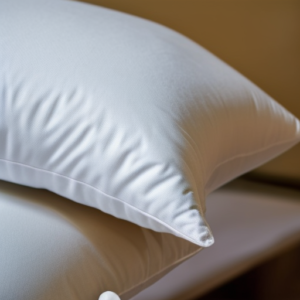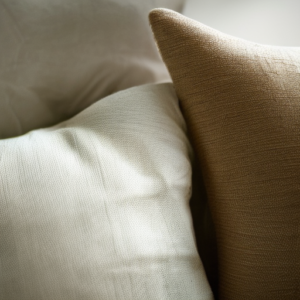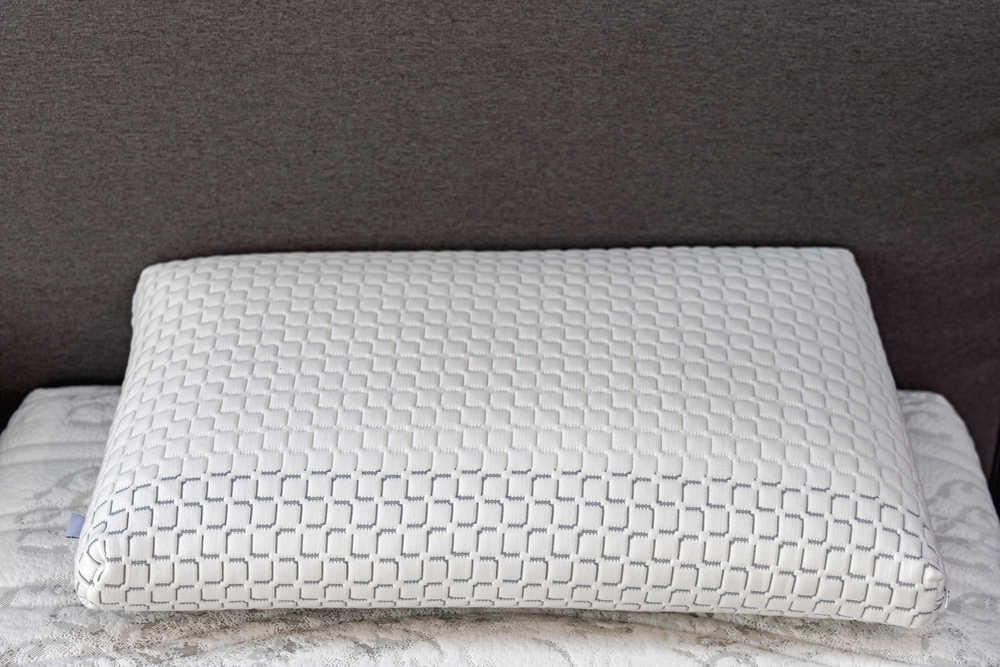Last Updated on February 14, 2023
Are you looking for the perfect pillow? Do you want to know which one will give you a better night’s sleep – memory foam pillows or bamboo? We’ll take a look at both in this blog post and compare them on comfort, price point, maintenance, durability and environmental impact. So let’s dive into it – memory foam pillows vs bamboo: who will win the battle of bedtime bliss?
Table of Contents:
- Comfort Comparison
- Maintenance
- Environmental Impact
- FAQs in Relation to Memory Foam Pillows vs Bamboo
- Conclusion
Comfort Comparison
Memory foam and bamboo pillows are two of the most popular pillow types on the market today. They both offer unique benefits in terms of comfort, support, and temperature regulation. Let’s take a closer look at how they compare.
When it comes to comfort, memory foam is often considered superior due to its ability to contour your body shape and provide even pressure distribution across your head and neck area. This makes it ideal for people who suffer from neck pain or stiffness, as it can help reduce discomfort by providing extra cushioning where needed. Bamboo pillows also offer excellent support but may not be quite as comfortable as memory foam due to their firmer nature.
Temperature regulation is another important factor when choosing a pillow type, and here again, memory foam tends to come out ahead thanks to its breathable construction, which helps keep you cool during hot summer nights while still offering plenty of warmth in colder months. Bamboo pillows are also designed with air flow in mind, so they should provide good temperature control too, though some users have reported feeling overheated when using them over extended periods of time.
When it comes to durability, memory foam is renowned for its longevity, with many users reporting up to 10+ years of use before needing a replacement. Bamboo pillows, however, may not last as long since their fillings can become compressed over time if used frequently without proper maintenance, such as regular fluffing or spot cleaning spills immediately after they occur.
Maintenance
Both offer comfort, support, and durability that can last for years with proper care. To ensure your memory foam or bamboo pillow lasts as long as possible, it’s important to clean them regularly and properly store them when not in use.
Cleaning Memory Foam Pillows

When cleaning a memory foam pillow, it’s best to start by vacuuming away any dust or debris that has accumulated on the surface of the pillow. This will help prevent dirt from getting into the fibres of the material, which could cause wear over time. After vacuuming, you can spot clean any stains using a mild detergent mixed with warm water and a soft cloth or sponge. Be sure to avoid scrubbing too hard, as this may damage the fabric of your pillow. Once finished, allow your memory foam pillow to air dry completely before putting it back on your bed.
Caring for Bamboo Pillows
To ensure your bamboo pillow remains in optimal condition, it is important to follow the manufacturer’s instructions when washing or spot-cleaning. This typically involves handwashing with cold water only (no bleach) and allowing them to air dry naturally without wringing out excess moisture after each wash cycle is complete. Additionally, if you have an adjustable model where one side has more stuffing than the other, make sure both sides are equally stuffed at all times so that they do not become lopsided over time.
Storing Your Pillow Properly
It is also important to store your memory foam or bamboo pillows correctly when not in use – ideally somewhere cool and dry, such as an unused closet shelf. This will prevent dust particles from accumulating quickly over time, which can lead to premature wear and tear down the line. If storing multiple pillows together, try placing a sheet between each one, so they do not rub against each other while being stored away. This will help maintain their shape better during extended periods without use.
Environmental Impact
But how do they compare when it comes to environmental impact?
When considering the production of memory foam, there are a few key factors that come into play. Memory foam is made from polyurethane, which is derived from petroleum-based products. The manufacturing process also involves volatile organic compounds (VOCs) such as formaldehyde, which can be released into the air during production and use. Additionally, memory foam typically contains flame retardants or other chemicals that may have an adverse effect on human health if not disposed of properly.
On the other hand, bamboo pillows are generally considered more sustainable than traditional memory foam due to their natural origin and biodegradable properties. Bamboo fabric is created by breaking down cellulose fibres found in bamboo plants through a chemical-free mechanical process called carbonization; this makes it much more eco-friendly than synthetic fabrics like polyester or nylon. Furthermore, since no VOCs or flame retardants are used in its production process, bamboo pillows pose less risk to human health compared to memory foam ones.

When it comes to disposing of either type of pillow material, memory foam should always be recycled rather than discarded as it is not biodegradable. However, many local recycling centres may not accept them, so check with your local municipality before attempting to dispose of any old bedding items. As for bamboo pillows, they can simply be composted after use since they are completely biodegradable; just ensure that the pieces are broken down into smaller sizes first in order for them to decompose more quickly.
Overall, while both materials offer great comfort levels and durability, when choosing between these two pillow types consider what kind of environmental impact each one has. At the end of the day, we all want our beds to feel good but still help us sleep soundly knowing that we have done our part for Mother Nature too.
FAQs in Relation to Memory Foam Pillows vs Bamboo
Is bamboo or memory foam better?
The answer to this question depends on the individual needs and preferences of the consumer. Bamboo is a natural material that is breathable, lightweight, and sustainable, making it an ideal choice for those looking for eco-friendly options. Memory foam offers superior comfort and support as it conforms to your body shape while providing pressure relief. Ultimately, both materials have their own advantages and disadvantages, so it’s important to consider what you need from your product before making a decision.
Are bamboo pillows better?
Bamboo pillows offer a unique blend of comfort and support, making them an ideal choice for many sleepers. They are naturally hypoallergenic, breathable, and moisture-wicking, which can help keep you cool during the night. Bamboo is also more durable than other materials like cotton or polyester, meaning it will last longer with proper care. Ultimately, whether bamboo pillows are better depends on your individual needs and preferences – but they do provide a great option for those looking for a comfortable yet supportive pillow that won’t break the bank.
Are bamboo memory foam pillows good?
Bamboo memory foam pillows offer a unique combination of comfort and support. The bamboo fabric helps to regulate temperature, while the memory foam contours to your body for optimal neck and head support. Additionally, these pillows are hypoallergenic and dust mite resistant, making them ideal for those with allergies or sensitivities. All in all, they provide a great night’s sleep that is both comfortable and supportive – perfect for anyone looking for an upgrade from their current pillow.
Is bamboo a memory foam?
No, bamboo is not a memory foam. Bamboo is a type of grass that can be used to make furniture and other items for the home and garden. Memory foam, on the other hand, is a type of polyurethane foam which has been engineered to provide cushioning and support while conforming to the shape of your body when you lie down or sit on it. It’s often used in mattresses, pillows, cushions and other bedding products.
Conclusion
When it comes to memory foam pillows vs bamboo, both offer unique benefits that make them great choices for your home. Memory foam pillows are more comfortable and affordable while bamboo pillows provide better maintenance and durability. However, when considering the environmental impact of each option, bamboo is a much better choice as it’s made from sustainable materials. Ultimately, the decision between memory foam or bamboo depends on your individual needs and preferences.
Paul is the type of person who never met a problem he couldn’t fix. He can always be found tinkering with something in his house, even if it isn’t broken! His tips and tricks are often shared on our site. He’s the one you call when something breaks because he has been known to improvise fixes for everything from leaky faucets to malfunctioning dryers.

